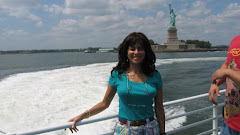Here is an article that makes the case that Americans must do a better job at becoming engaged and informed global citizens. The new President must lead the charge.
A Nation of Internationalists
By Martin Savidge
http://www.huffingtonpost.com/martin-savidge/a-nation-of-international_b_137976.html
According to the conventional wisdom, this election is all about domestic issues. Jobs, finances, mortgages and falling commodity prices are the topics to which the campaigns are scrambling to respond, but to buy into the idea that these issues are purely domestic in scope is to be living in the past. More now than at any time in our history, our domestic problems are immediately linked to world events.
Our nation can no longer look primarily inward to find the answers. We must live in the wider world.
We may not yet know if he is a Republican or Democrat, but it's clear the next president will have to be an internationalist. Coming into office in the midst of a world financial crisis, two foreign wars, and a rapidly evolving diplomatic portfolio, the new president will be forced to focus on global events, and the United States' position in every major international development, beginning day one.
Certain foreign affairs policies of the last eight years, such as the President's Emergency Plan for Aids Relief (PEPFAR) and the Administration's initiatives in Africa, have been successful because they were based on a solid understanding of international events. These programs demonstrate the positive effect of well-informed action. But, one can just as easily find examples foreign affairs initiatives which have faltered or flatly failed, primarily because our efforts may not have been as well informed, or may not have taken full advantage of the expertise of the world community.
The days are gone when a small American company can count on the local community for its customer base. Everyone from the CEO of a Fortune 500 company to the owner of an Erie, Pennsylvania-based manufacturing concern with 20 employees, to a Vermont-based antique shop owner, now works internationally. Clients are no longer across town; they are working across borders and oceans, taking the best products for the money from the suppliers that meet their needs. Every American, not just venture capitalists and politicians, but workers and owners, are part of a global network.
This isn't speculative; this is the current state of American business and life. We are part of the world, and yet, we seem to want to avoid acknowledging that fact. And, as a result, we too often go into that global arena half prepared.
According to a National Geographic survey, after several years of war more than two-thirds of American students still fail to find Iraq on a world map. Nearly 45% failed to find Iran and Israel. Less than half of students 18-24 could find Ohio on a map of the U.S. These are the kind of figures that scare us, and rightly so. If we are going to do business, we need to produce a next generation that has a basic understanding of the global economy and political situation.
The same interconnectivity that has caused economies to shift toward a global orientation provides that tools our businessmen, students and workers need to compete. Information is the most powerful and important of these tools, and it is incumbent upon everyone from educators, to consumers of news, to business owners, and even the President, to instill a sense of global citizenship and sense of our place in the world. We have to see that our neighbors, our customers, and our friends may not live close by.
We can no longer treat the rest of the world as foreigners. We must become a nation of internationalists.
Monday, October 27, 2008
Subscribe to:
Post Comments (Atom)






.jpg)
.jpg)




No comments:
Post a Comment